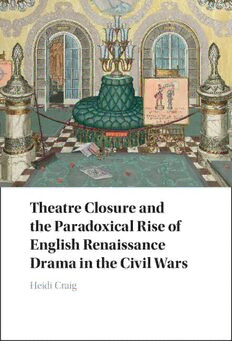
Theatre Closure and the Paradoxical Rise of English Renaissance Drama in the Civil Wars PDF
257 Pages·2023·5.806 MB·English
Most books are stored in the elastic cloud where traffic is expensive. For this reason, we have a limit on daily download.
Preview Theatre Closure and the Paradoxical Rise of English Renaissance Drama in the Civil Wars
Description:
Focusing on the production and reception of drama during the theatre closures of 1642 to 1660, Heidi Craig shows how the 'death' of contemporary theatre in fact gave birth to English Renaissance drama as a critical field. While the prohibition on playing in many respects killed the English stage, drama thrived in print, with stationers publishing unprecedented numbers of previously unprinted professional plays, vaunting playbooks' ties to the receding theatrical past. Marketed in terms of novelty and nostalgia, plays unprinted before 1642 gained new life. Stationers also anatomized the whole corpus of English drama, printing the first anthologies and comprehensive catalogues of drama. Craig captures this crucial turning-point in English theatre history with chapters on royalist nostalgia, clandestine theatrical revivals, dramatic compendia, and the mysteriously small number of Shakespeare editions issued during the period, as well as a new incisive reading of Beaumont and Fletcher's A King and No King.
See more
The list of books you might like
Most books are stored in the elastic cloud where traffic is expensive. For this reason, we have a limit on daily download.
